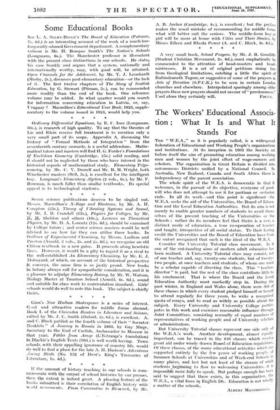The Workers' Educational Associa- tion : What It Is and
What It Stands For THE " W.E.A.," as it is popularly called, is a widespread federation of Educational and Working People's organizations and institutions. At its inception in 1903 the Society set before itself the aim of promoting education among working men and women by the joint effort of wage-earners and scholars. The organization in Great Britain is divided into autonomous Districts unified by a National Council. In Australia, New Zealand, Canada and South Africa there is independency of the parent association.
The whole spirit of the W.E.A. is democratic in that it welcomes, in the pursuit of its objective, everyone of good- will who does not attempt to use it for partisan or sectarian ends. In all its work—and this point is significant—the W.E.A. seeks the aid of the Universities, the Board of Educa- tion and the Local Education Authorities. But its aim is not merely to enable greater numbers of students to avail them- selves of the present teaching of the UniVersities or the Schools ; rather do its members feel that theirs is a new, a distinct mode of education, a true co-operation of teacher and taught, irrespective of all social status. To their lasting credit the Universities and the Board of Education have from the outset recognized that such is the ideal of the W.E.A.
Consider the University Tutorial class movement. In it one of the outstanding aims of modern adult education has been realized. A University Tutorial class may consist, not of one teacher and, say, twenty-one students, but of twenty- two people, at once teachers and students, of whom one must be a scholar capable of directing the class. This " teacher- director" is paid, but the rest of the class contribute little to his emolument. That is where the Board and the Local Education Authority most markedly step in. During the past winter, in "England and Wales alone, there were 509 of these classes in which every student pledged himself or herself to attend regularly for three years, to write a recognized quota of essays, and to read as widely as possible about the subject. Every University and University College partici' pates in this work and exercises reasonable influence through Joint Committees, consisting normally of equal numbers of representatives of working people and of University scholars or administrators.
But University Tutorial classes represent one side only of the W.E.A.'s • work. Another development, almost equally. important, can be traced in the 646 classes which receive. grant aid under wisely drawn Board of EduCation regulations. Of these classes, of the many educational activities which are supported entirely by the few pence of working people, of Summer Schools at Universities and of Week-end Schools in many phiCes, and last but not least of the stream of adult students ,beginning to flow to welcoming Universities, it i5 impossible more fully to speak. But perhaps enough has been said to' suggest that there exists, in this organization, the W.E.A., a vital force in English life. Education is not wholly a matter of the schools.
ALBERT MANSBRIDGE.


























































 Previous page
Previous page